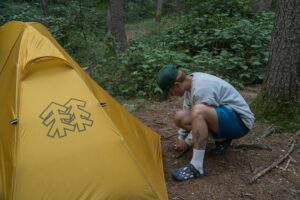The Great Outdoors: Your Essential Beginner’s Guide to Mastering Camping


Mastering Camping offers a unique way to reconnect with nature, unwind from daily stresses, and create unforgettable memories. However, for beginners, stepping into the wilderness can feel overwhelming. This guide includes essential tips and insights to help you master camping confidently. Your outdoor adventure can be enjoyable and safe with preparation and the right mindset.
Choosing the Right Campsite
Selecting the perfect campsite is the first crucial step toward a successful camping trip. When choosing your spot, consider accessibility, safety, and the environment. Many beginners overlook the importance of researching the location in advance. By checking weather forecasts, terrain type, and available amenities, you ensure a comfortable and secure stay.
Moreover, pay attention to campground rules and regulations. Some areas require reservations or permits or have restrictions on campfires and noise. Visiting established campgrounds is advisable for first-timers, as they typically offer restrooms, water sources, and marked trails. On the other hand, if you crave solitude, look for dispersed camping options, but be prepared for fewer amenities and more self-sufficiency.
Packing Smart and Light
One of the biggest challenges beginners face is packing the right gear without overloading their backpacks. List essentials like a durable tent, sleeping bag, appropriate clothing, and cooking supplies to avoid unnecessary weight. Always bring layered clothing to adapt to changing temperatures and weather conditions.
In addition, prioritize multifunctional items to save space. For instance, a pot that doubles as a bowl or a flashlight with extra batteries can be invaluable. Pack enough food and water, but avoid excess that could weigh you down. Lastly, don’t forget safety gear such as a first aid kit, insect repellent, and navigation tools like maps or GPS devices. Thoughtful packing ensures you have what you need without extra weight.
Setting Up Camp Efficiently
Arriving at your campsite early can make setting up your tent and other equipment easier, especially if you’re new to camping. Begin by choosing a flat, dry area away from hazards like falling branches or flood zones. Then, clear the ground of rocks and debris before pitching your tent. This preparation protects both you and your gear.
Furthermore, mastering tent assembly before your trip helps speed up the process and reduces frustration. Practice setting up your tent at home or in a backyard. Once your shelter is secure, organize your campsite to keep items easily accessible but protected from wildlife. Establishing a cooking area downwind from your tent helps keep food smells away and prevents unwanted animal visits. An efficient setup creates a comfortable base to relax and enjoy your surroundings.
Cooking and Eating Outdoors
Eating well is essential for maintaining energy and morale during camping trips. While bringing convenience foods is tempting, fresh and nutritious meals improve your overall experience. Plan simple recipes that require minimal preparation and cleanup, such as foil packet meals, sandwiches, or dehydrated camping meals.
Also, invest in a reliable camping stove or portable grill if open fires are not allowed or practical. When cooking over a fire, ensure you understand proper fire safety and always fully extinguish flames afterward. Storing food in sealed containers or bear-proof canisters protects it from wildlife and keeps your campsite clean. By preparing smart and safe meals, you’ll fuel your adventure and enjoy the taste of the great outdoors.
Staying Safe and Respecting Nature
Safety is paramount when camping, particularly for beginners. Always inform someone about your trip plans, destination, and expected return. Carry a well-stocked first aid kit and know how to use it for common injuries like cuts, burns, or insect bites. Staying hydrated and avoiding overexertion also reduce risks.
Moreover, camping responsibly means respecting the environment. Follow Leave No Trace principles by packing out all trash, minimizing campfire impact, and avoiding disturbing wildlife. Staying on marked trails prevents soil erosion and protects plant life. By prioritizing safety and environmental stewardship, you preserve natural beauty and ensure future campers can enjoy it.
Embracing the Camping Experience
Lastly, immerse yourself in the camping adventure by embracing challenges and joys. Disconnect from digital distractions and appreciate the simplicity of nature. Engage in hiking, bird watching, or stargazing to deepen your outdoor connection.
Remember that mishaps and learning moments are part of the journey. Whether it’s a sudden rainstorm or a forgotten utensil, maintaining a positive attitude helps you adapt and grow as a camper. Share stories and laughter around the campfire, and savor the accomplishment of mastering the great outdoors.
Camping is an enriching experience that rewards preparation, respect, and a willingness to learn. By following this beginner’s guide, you’ll build confidence and create lasting memories under the open sky. So pack your gear, step outside, and let your outdoor adventure begin!
